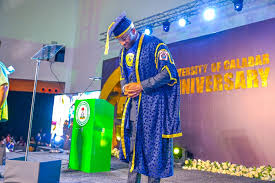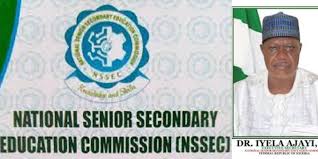
National Devt: How universities can shape Nigeria’s future – Deputy Speaker Kalu
An investment in knowledge yields the highest returns. – Benjamin Franklin, American Diplomat and Author.
For centuries, universities have been esteemed as centers of knowledge, hubs of innovation, and drivers of advancement. Their influence extends beyond the development of individual intellects; they significantly affect the communities and nations they serve.
Universities are increasingly acknowledged as vital collaborators in tackling urgent societal issues and fostering economic development. By leveraging their intellectual resources, research expertise, and community involvement, these institutions can serve as formidable agents of change.
In Nigeria, for example, universities are anticipated to play a crucial role in confronting the nation’s developmental challenges and positioning the country for progress. Through innovative research, strategic partnerships, and outreach initiatives, these institutions can address critical concerns such as healthcare, education, and economic empowerment.
These concepts were articulated by Rt. Hon. Benjamin Okezie Kalu, the Deputy Speaker of the House of Representatives, who served as a guest lecturer at the 37th convocation ceremony of the University of Calabar, Cross River State, on Thursday, March 20, 2025.
Entitled “Our Gown in Town and in Cyberspace: Sustainable and Human-Centered Education, The Mandate of Our Universities, 2025-2075,” Kalu presented a compelling lecture that aligned with the University’s 50th anniversary, envisioning Nigeria’s future through the transformative potential of universities over the next five decades.
The Deputy Speaker asserted that in a world where change is the only constant, education serves as a guiding light that can pave the way for progress and prosperity.
The influence of education is undeniably complex, affecting not only individuals but also the very structure of society. It cultivates intellect, promotes critical analysis, and stimulates creativity. Education serves as the foundation upon which civilizations are established, shaping future leaders and equipping them with the essential skills to confront the challenges of a rapidly changing world.
For Kalu, the insights gained from educational institutions prepare individuals to adeptly handle the intricacies of the 21st century.
Filled with nostalgia, the Deputy Speaker stood with pride in Calabar, receiving enthusiastic applause from his classmates and numerous dignitaries who had gathered in large numbers to express their support. As a notable alumnus who graduated 27 years ago from the prestigious law faculty, class of ’98, he epitomized the essence of the university.
With deep emotion, Kalu conveyed his heartfelt thoughts, emphasizing the evolution of education. His remarks resonated profoundly, inspiring the young audience and rekindling fond memories among his peers and all attendees at the expansive Calabar International Conference Centre (CICC), the site of the convocation lecture.
He stated: “As we commemorate this institution’s 50-year legacy, it is crucial to acknowledge that education is transforming. The gown that once roamed the streets must now traverse cyberspace. During my time as a student, technology felt like a distant aspiration. We had only a handful of computers, relied on library shelves for books, and discovered knowledge by chance; our handwritten notes were cherished like treasures. Today, information travels at lightning speed, knowledge is accessible with a simple click, and the world has turned into a digital campus where screens serve as classrooms.
“However, amidst these advancements, one principle must remain constant. Education should always be centered on humanity. Technology should serve as our tool, not our overlord. As we contemplate the next fifty years, we must reflect on our mission.”
The task ahead is evident: our universities must transition from theoretical frameworks to practical applications, bridging the gap between academia and the community—and now extending into the digital realm—where knowledge is utilized and innovative ideas foster change. In his influential work, The School and Society, John Dewey underscores the necessity for education to adapt alongside societal transformations, warning against antiquated teaching practices that do not adequately prepare students for future challenges.
The true effectiveness of education is reflected in its influence on the community. How many university initiatives directly address local issues such as energy, healthcare, water accessibility, food security, or transportation? If universities do not prioritize serving their own communities, their accomplishments risk being isolated within academic confines.
Our research should yield practical solutions, and graduates must be prepared to confront real-world challenges, ranging from policy enhancement to sustainable transportation. If the community does not experience the benefits of our academic endeavors, our educational efforts remain incomplete.
Our universities serve as more than mere educational institutions; they are fundamental to the fabric of our communities and our nation. Their significance is not measured by diplomas but by their tangible impact on the world. Institutions must transcend mere academic discourse, generating research that proactively influences policy rather than merely responding to crises. They should act as centers for policy development, both locally and globally, demonstrating that the intersection of education and innovation leads to effective solutions.
The Deputy Speaker further highlighted that the incorporation of technology in education has significantly enhanced its influence. He noted that the digital revolution has democratized access to information, allowing students from diverse backgrounds to connect with premier educational resources.
In this context, online platforms, virtual laboratories, and interactive tools have revolutionized the educational experience, making it more engaging, effective, and inclusive.
Kalu also provides real-world examples that showcase the significant role of education in fostering community development.
He noted that programs like MIT’s D-Lab, Stanford’s StartX accelerator, and the University of Cape Town’s Water Research Commission exemplify how academic innovation can be leveraged to tackle urgent societal issues, stimulate economic development, and enhance quality of life.
“Education should be a lifelong pursuit. Reflecting on my own educational journey, I recall a time when we had only a few computers and relied on typewriters instead of laptops. Even now, I continue to learn and grow. If we want students to be ready for the future, it is essential that our educators also embrace the role of learners. As Alvin Toffler insightfully stated, ‘The illiterate of the 21st century will not be those who cannot read and write, but those who cannot learn, unlearn, and relearn.’
“Education transcends the mere acquisition of knowledge; it involves applying that knowledge to shape the future. If our universities do not evolve, we risk graduating individuals who are ill-equipped for the challenges of the world they will face.
“Global Examples: Education as a Catalyst for Community Transformation: This concept extends beyond Nigeria; worldwide, universities are redefining their roles by aligning research with the needs of their communities. For instance, MIT’s D-Lab has impacted over 30 countries by developing affordable technologies that empower rural populations. By equipping students to create sustainable solutions—ranging from solar-powered irrigation systems to cost-effective medical devices—MIT illustrates that academic excellence can coexist with community benefit.
Stanford and Silicon Valley: Stanford University serves not only as a center of academic innovation but also as a significant contributor to economic growth in Silicon Valley. Through its StartX accelerator, Stanford has facilitated the launch of more than 200 startups, collectively raising over $10 billion in venture capital. This fusion of entrepreneurial drive with academic research has revitalized local communities and established a global standard for service exports.
University of Cape Town (UCT): In South Africa, UCT’s Water Research Commission collaborates closely with local municipalities to enhance water management practices. Their initiatives have positively impacted over a million individuals by formulating strategies to tackle water scarcity and improve sanitation, demonstrating the significant social benefits of community-focused research.
Indian Institutes of Technology (IITs): In India, the IITs have established incubators that have spurred the creation of more than 500 startups, resulting in billions of dollars in revenue. Their methodology has not only improved local agricultural productivity through innovative farming techniques but has also established India as a leading exporter of technical expertise and services.
Wageningen University: In the Netherlands, the pioneering agricultural research conducted at Wageningen University has played a crucial role in increasing yields for smallholder farmers worldwide, highlighting the effectiveness of targeted research in addressing pressing food security issues.
These instances clearly illustrate that when universities align their efforts with the needs of their communities, innovation thrives, and local challenges transform into opportunities for significant change, as noted by Kalu.





